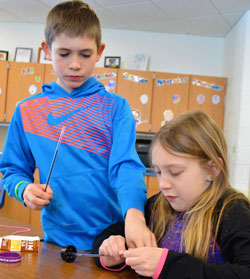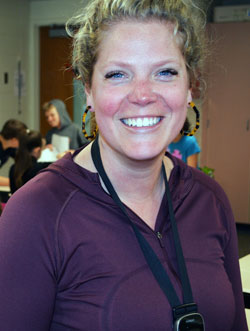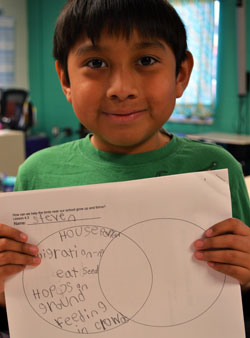A recent lesson for third-graders in Beth Lehner’s class at Sparta’s Appleview Elementary: How to design fun moving toys that other kids can make at home?
Students were given a milk carton, a piece of string, four wheels, four straws and some tape. The goal: build a car that moves.

“I could give directions to you, but today you will need to figure it out on your own through exploration,” Lehner told her class. “You have supplies, you need to figure it out.”
The project-based physics lesson is as new to Lehner as it is to her students. “I like it because it gets the kids way more involved in the learning,” she said, adding, “Their interest level is a lot higher.”
But don’t take it from the teacher.
“I really didn’t get to do much science before,” said third-grader Davin Steenstra, “but now it’s one of my favorite subjects in school.”
A few weeks later, in Amy Schelhaas’ West Oakview Elementary class in Northview, her third-graders had recently begun a unit that aimed to answer the question: How do birds survive in Michigan winters? They were to study them, consider their lives hour by hour, write about them, draw them, and even build feeders for them.

Doing Makes the Difference
Third-grade teachers in Sparta, Northview, Kentwood and Wyoming are participating this year in a pilot science program that ties Next Generation Science Standards (NGSS) to lessons in math and literacy.
The Multiple Literacies in Project-Based Learning Pilot is a five-year, $5.5 million research effort funded by Lucas Education Research, a division of the George Lucas Educational Foundation.
Wendi Vogel, Kent ISD science consultant, said the pilot aims to see if reading and writing scores will go up as a result of teaching science using the units developed by Michigan State University and University of Michigan.
The big shift in science education right now, Vogel said, is from “learning about” a topic to trying to “figure out” something, such as a problem or a phenomenon.

Third-graders began the year learning about adaptation, with the question “Why do I see so many squirrels, but I can’t find any Stegosauruses?”
Students looked outside for both, and then figured out why the squirrel, with its adaptations such as ankle bones, tail and diet, help it to survive and thrive in our area.
“One thing we don’t have a lot of right now are well-aligned and designed resources for elementary NGSS, so we jumped at the chance to be involved in this,” Vogel said. “They’re not just memorizing stuff, they’re trying to figure out problems. It’s a game-changer.”

Next Year and Beyond
Wyoming, Kentwood and Northview also have control schools, of which Kent City is one — that are not using the unit being piloted. Control schools will use the piloted materials next year, and receive professional development and kits as part of a grant that the CREATE for STEM Institute, housed at MSU, has received to do the study.
The plan is that students using the piloted materials this year will continue next year in an expanded version of the pilot. Vogel said K-2 materials are currently being developed for that.














